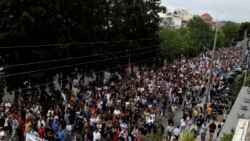LONDON —
Unions and politicians in Greece are urging the government to reverse its decision to close the state broadcaster -- the Hellenic Broadcasting Corporation, or ERT. The decision to take it off the air prompted widespread protests. Labor unions will strike in protest Thursday and there are fears the controversial decision could plunge Greece back into political chaos.
An emotional farewell to colleagues in the newsroom of Greek state broadcaster ERT Tuesday night.
Then, as the newsreader began a live interview, the channel was pulled from the airwaves.
Some 2,700 ERT workers have seen their jobs suspended. Many refused police orders to leave the building and remained at their desks. Outside, the demonstrations have swelled.
“For us, there is only one way forward -- resistance and the overturning of this situation, the rape of state television and news gathering," said Panagiotis Kalfayiannis, president of the ERT Workers’ Union. "We hope this will be a catalyst.”
The government said the closure is temporary - aimed at stanching what it called an "incredible waste" of taxpayers' money and satisfying international lenders. A smaller state broadcaster will be set up, and workers will be compensated.
But the backlash appears to have caught the government by surprise, said political analyst Dionyssis Dimitrakopoulos of Birkbeck College in London.
“There is absolutely no doubt about the fact that that particular company needs to be reformed dramatically. But there is reform and there is reform. And shutting it down is not the kind of welcome reform that many Greeks want. This particular company is a symbol of freedom,” Dimitrakopoulos noted.
The shutdown was not debated in parliament but forced through by ministerial decree.
It has sparked an internal revolt in Greece’s fragile governing coalition, with the two smaller parties voicing strong opposition.
Dionyssis Dimitrakopoulos warns Greece’s political crisis could be rekindled. “The worst case scenario is for the government to collapse and a new electoral contest to take place. This is the last thing that the country needs,” he said.
ERT had been on air since 1938 - but its audience share had dwindled to 13 percent.
In the Greek islands and regions, the state broadcaster played an important role, says Panayiotis Demopoulos, an activist in the northern region of Kozani.
"For people in the provinces, the ERT has always been a service that safeguarded the Greek people’s participation in democratic decision making," Demopoulous said. He added the broadcaster’s closure is indicative of a wider democratic shortfall. "Everything happened in an extremely rapid and autocratic way, which suggests - without exaggerating or being metaphorical - that those in power are now practicing a dictatorial form of government," he stated.
The protests compound a volatile week, after the government failed to sell the state-owned gas utility - part of a huge sell-off of state assets demanded by the EU and IMF bailout terms.
The EU has called on Greece to stick to its timetable.
An emotional farewell to colleagues in the newsroom of Greek state broadcaster ERT Tuesday night.
Then, as the newsreader began a live interview, the channel was pulled from the airwaves.
Some 2,700 ERT workers have seen their jobs suspended. Many refused police orders to leave the building and remained at their desks. Outside, the demonstrations have swelled.
“For us, there is only one way forward -- resistance and the overturning of this situation, the rape of state television and news gathering," said Panagiotis Kalfayiannis, president of the ERT Workers’ Union. "We hope this will be a catalyst.”
The government said the closure is temporary - aimed at stanching what it called an "incredible waste" of taxpayers' money and satisfying international lenders. A smaller state broadcaster will be set up, and workers will be compensated.
But the backlash appears to have caught the government by surprise, said political analyst Dionyssis Dimitrakopoulos of Birkbeck College in London.
“There is absolutely no doubt about the fact that that particular company needs to be reformed dramatically. But there is reform and there is reform. And shutting it down is not the kind of welcome reform that many Greeks want. This particular company is a symbol of freedom,” Dimitrakopoulos noted.
The shutdown was not debated in parliament but forced through by ministerial decree.
It has sparked an internal revolt in Greece’s fragile governing coalition, with the two smaller parties voicing strong opposition.
Dionyssis Dimitrakopoulos warns Greece’s political crisis could be rekindled. “The worst case scenario is for the government to collapse and a new electoral contest to take place. This is the last thing that the country needs,” he said.
ERT had been on air since 1938 - but its audience share had dwindled to 13 percent.
In the Greek islands and regions, the state broadcaster played an important role, says Panayiotis Demopoulos, an activist in the northern region of Kozani.
"For people in the provinces, the ERT has always been a service that safeguarded the Greek people’s participation in democratic decision making," Demopoulous said. He added the broadcaster’s closure is indicative of a wider democratic shortfall. "Everything happened in an extremely rapid and autocratic way, which suggests - without exaggerating or being metaphorical - that those in power are now practicing a dictatorial form of government," he stated.
The protests compound a volatile week, after the government failed to sell the state-owned gas utility - part of a huge sell-off of state assets demanded by the EU and IMF bailout terms.
The EU has called on Greece to stick to its timetable.








